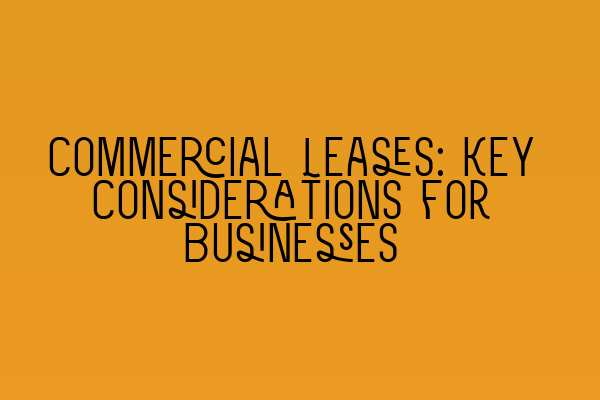Commercial Leases: Key Considerations for Businesses
Commercial leases play a crucial role in the success of businesses. Whether you’re a small startup or an established company, understanding the key considerations when entering into a commercial lease is essential. In this blog post, we will explore the important factors that businesses should be aware of when negotiating and signing a commercial lease agreement.
1. Lease Term
The first consideration is the lease term, which refers to the length of time for which the lease will be in effect. This can vary depending on the needs of the business. Short-term leases are typically more flexible, allowing for easy relocation or expansion, while long-term leases offer stability and security. Consider your business goals and growth plans before deciding on the lease term that suits your needs.
2. Rent and Additional Costs
Another crucial factor is the rent and additional costs associated with the lease. It’s important to understand the breakdown of costs, including base rent, service charges, and insurance contributions. Carefully review the lease agreement to ensure that the costs are reasonable and clearly defined. It’s also worth negotiating for rent reviews and understanding how they will be calculated to avoid any surprises in the future.
3. Break Clauses
Having a break clause in the lease agreement provides flexibility for businesses. This clause allows either party to terminate the lease before the end of the agreed term. It’s essential to understand the conditions and notice period required for exercising the break clause. This can protect your business in case of any unforeseen circumstances or changes in requirements.
4. Repair and Maintenance
Understanding your responsibilities regarding repair and maintenance is crucial. The lease agreement should clearly outline who is responsible for maintaining the property, including repairs, renovations, and compliance with building regulations. It’s essential to negotiate favorable terms to ensure that you are not burdened with unnecessary costs or liabilities.
5. Use and Alterations
Consider the permitted use of the property and any restrictions or limitations imposed by the lease. Ensure that the lease allows for your intended business activities. If you anticipate the need for alterations or renovations to accommodate your business operations, negotiate the terms for obtaining necessary permissions from the landlord.
6. Assignment and Subletting
If you foresee the possibility of relocating or downsizing your business, it’s crucial to understand the lease terms regarding assignment and subletting. These clauses outline whether you can transfer the lease to another party or sublet the space to another tenant. Negotiating favorable terms can provide flexibility and options for your business in the future.
7. Rent Review and Renewal
Rent reviews and lease renewals are key considerations for businesses. Rent reviews allow for the adjustment of rental payments, usually after a specified period. Understanding how rent reviews will be conducted and calculated can help you plan for potential increases. Lease renewals give you the option to extend your lease at the end of the agreed term. It’s important to understand the conditions and notice periods for lease renewal to avoid any disruptions to your business.
8. Legal Advice
Entering into a commercial lease is a significant commitment, and seeking legal advice is highly recommended. A qualified solicitor can review the lease agreement, negotiate terms on your behalf, and ensure that your interests are protected. They can guide you through the complex legalities of commercial leases and assist you in making informed decisions for your business.
Conclusion:
Commercial leases are complex legal contracts that require careful consideration. By understanding and negotiating the key factors highlighted in this article, businesses can enter into a lease agreement that aligns with their goals and protects their interests. Seeking legal advice from experienced property law solicitors, such as SQE Property Law & Land Law, is essential to ensure a smooth and legally sound leasing process.
Related Articles:
– SQE 1 Practice Exam Questions
– SQE 1 Practice Mocks FLK1 FLK2
– SQE 2 Preparation Courses
– SQE 1 Preparation Courses
– SRA SQE Exam Dates
